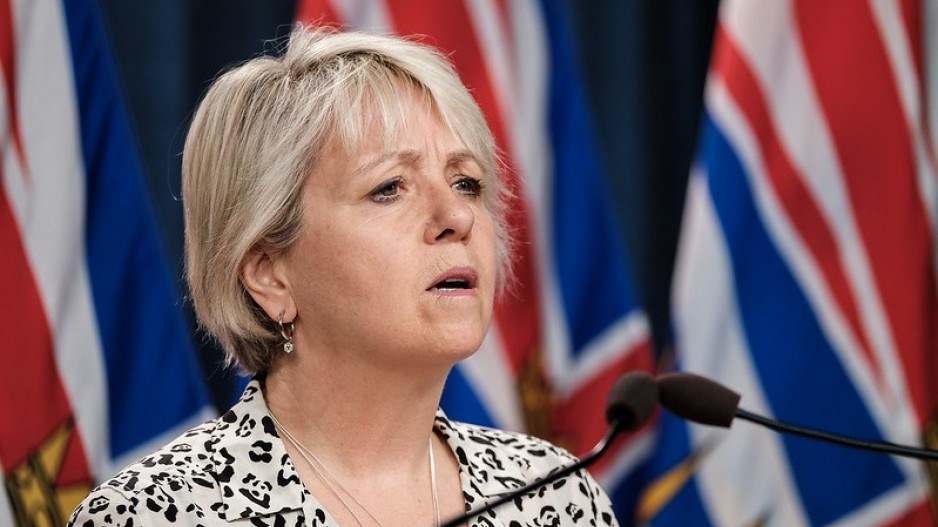New B.C. government data shows that the number of British Columbians with COVID-19 infections serious enough to put them in hospital has again risen to the 500 threshold.
The number of those sick enough to need to be in intensive care units has risen by six overnight, to tie the record of 164 set on April 21.
The total of 500 people in B.C. hospitals with the disease is two people below the province's record of 502, set on April 22.
Some good news is that no one is known to have died from COVID-19 in the past day in B.C., keeping the province's death toll from the virus at 1,571.
There were 799 people newly diagnosed as being infected with COVID-19, and this is only the second time this month that this number has been in the 700s. The new cases push the total number of known COVID-19 infections in B.C. to 127,048, with more than 92.2%, or 117,150 people considered by the B.C. government to have recovered.
Most of the new infections are in the Fraser Health region, and that region's percentage of the provincial total has been rising.
Here is the breakdown of where the 799 people with infections detected in the past day reside, by health region:
• 121 in Vancouver Coastal Health (15.1%);
• 534 in Fraser Health (66.8%);
• 28 in Island Health (3.5%);
• 96 in Interior Health (12%);
• 16 in Northern Health (2%); and
• four people who usually reside outside Canada.
Provincial health officer Bonnie Henry and Health Minister Adrian Dix in a joint statement provided no new information about mutant strains of the SARS-CoV-2 virus, which causes COVID-19. Provincial officials have stopped conducting full genome sequencing on newly detected positive COVID-19 cases specifically to look for the so-called variants of concern, and are instead spending that time looking for potential vaccine failures, and reinfections.
The vast majority of the 8,089 people known to be actively fighting infections have been told to self-isolate. The province has not had that few people actively battling infections since April 1.
Health officials are actively monitoring 11,792 people for symptoms because they have had known contact with individuals identified as having been infected. That is the lowest number of people under observation since April 1.
Vaccine shortages have kept the province's vaccination campaign in check, but 35,756 doses were provided to 35,334 people in the past day, with 422 others getting needed second doses.
In total, B.C. officials have provided 1,671,128 doses of vaccine to 1,581,671 people, with 89,457 getting second doses.
As of today, people aged 59 years old, and older, are eligible to book appointments to receive Pfizer or a Moderna vaccine shots through the province's age-based vaccination campaign. People who are at least 18 years old are eligible to register for that program, and they will be alerted once they are eligible to book an appointment.
Since April 19, people who are 40 years old and older have been eligible to book appointments to get an AstraZeneca vaccine shots at hundreds of participating pharmacies across the province.
As of today, people who are 30 years old and older, and who live in high-transmission neighbourhoods in Fraser Health and Vancouver Coastal Health are eligible to go to drop-in clinics.
The hot spots of eligibility for this include:
• Brittania Beach;
• D'arcy;
• East Newton;
• Fleetwood;
• Kensington;
• North Delta;
• North Surrey;
• Panorama;
• Pinecrest Estates;
• Port Coquitlam;
• South Langley Township;
• Squamish;
• Whalley;
• West Abbotsford; and
• West Newton.
"As we receive enough AstraZeneca to add appointments at pharmacies, it will be made available to anyone in the province aged 30 and older," Henry and Dix said.
"Whether you had your vaccine last month, or are booked for the days ahead, we remind everyone to continue to use all of your layers of protection."
The B.C. government today extended its state of emergency through the end of the day on May 11. The longest that it can legally extend the state of emergency is for two weeks, and it has been extending the state of emergency every two weeks for more than a year.
There remain eight active outbreaks at long-term living, or seniors' homes in B.C. They are:
• Acropolis Manor in Prince Rupert;
• Cottonwoods Care Centre in Kelowna.
• Craigdarroch Care Home in Victoria.
• Dufferin Care Centre in Coquitlam;
• Mount St. Mary in Victoria;
• Orchard Haven in Keremeos;
• Sandalwood Retirement Resort in Kelowna; and
• Sunset Manor in Chilliwack.
Seven hospitals in B.C. continue to have active COVID-19 outbreaks. They are:
• Abbotsford Regional Hospital in Abbotsford;
• Dawson Creek and District Hospital in Dawson Creek;
• Nanaimo Regional General Hospital in Nanaimo;
• Prince Rupert Regional Hospital in Prince Rupert;
• Surrey Memorial Hospital in Surrey;
• UBC Hospital in Vancouver; and
• Vancouver General Hospital in Vancouver.




